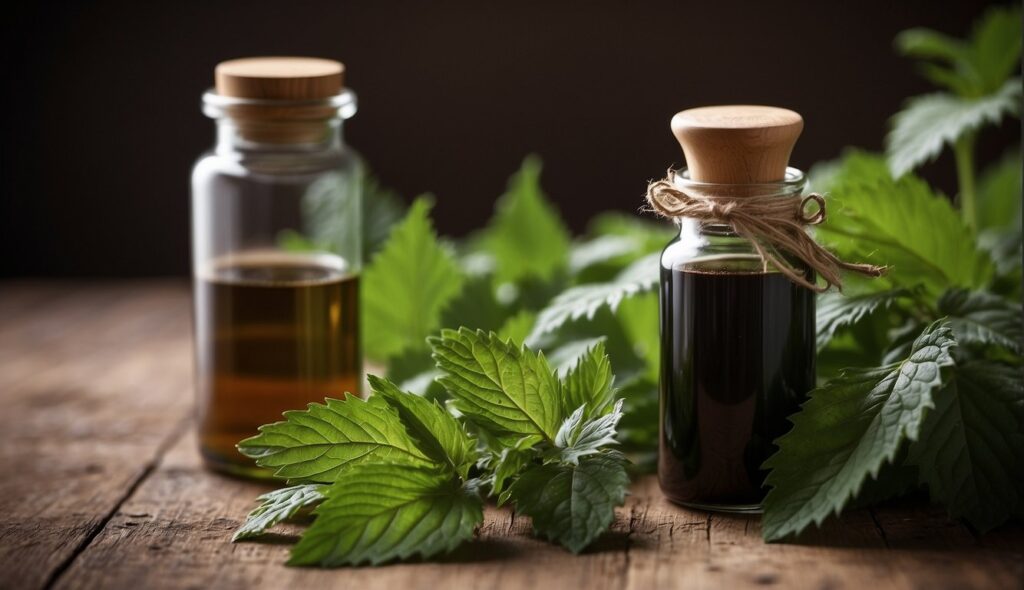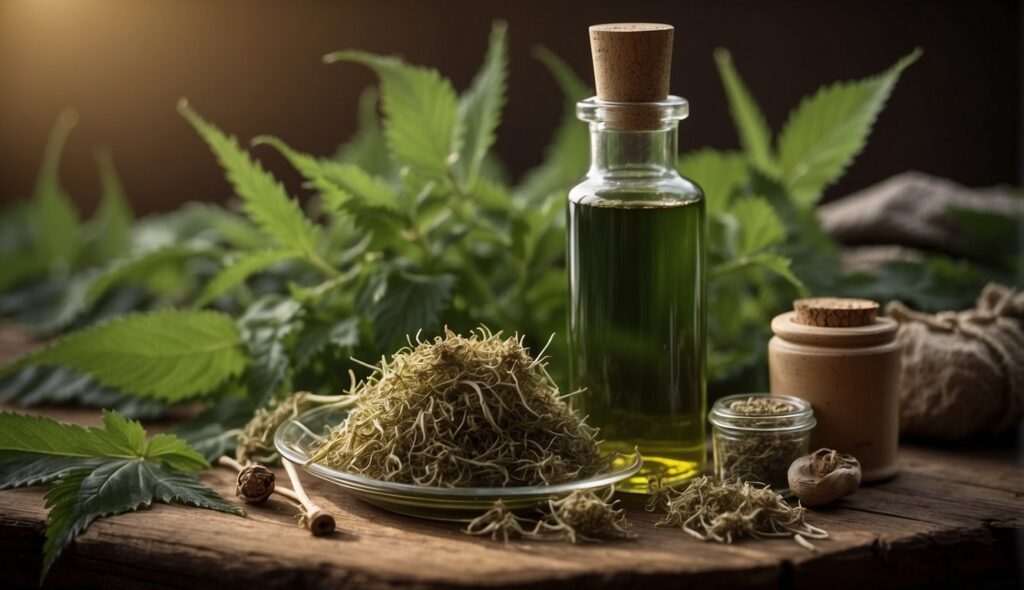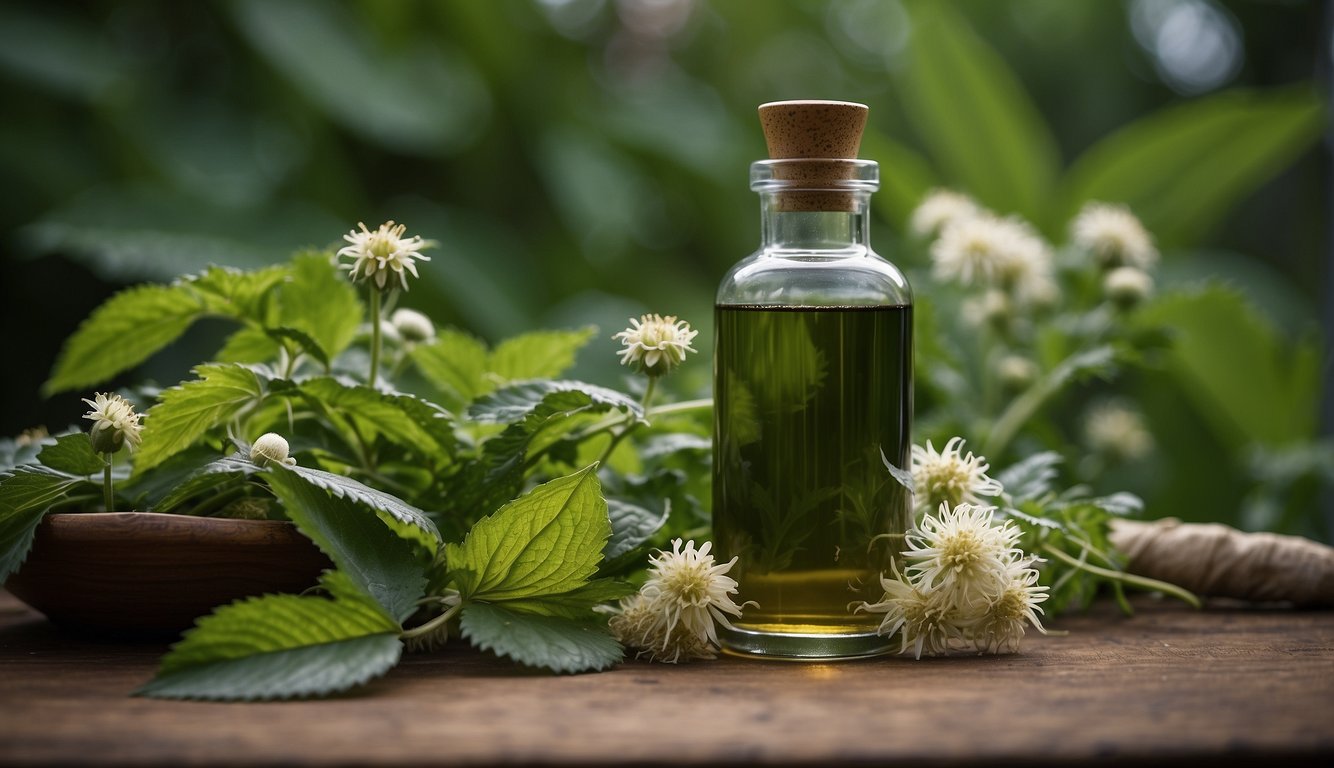Stinging nettle root tincture is a well-known herbal remedy that has been relied on for centuries to address a variety of health concerns. The tincture is made by steeping the roots of the stinging nettle plant in alcohol to extract its beneficial compounds. For generations, it has been used to support overall health and well-being.
The resulting liquid is then taken orally or applied topically to the skin. Stinging nettle root tincture is known for its many health benefits, including its ability to reduce inflammation, relieve pain, and improve urinary tract function.
It is also a natural diuretic, which can help to flush toxins from the body and reduce water retention. In addition, stinging nettle root tincture has been shown to improve prostate health and alleviate symptoms of allergies and hay fever.
What Is Stinging Nettle Root Tincture?
As someone interested in natural remedies for years, I have come across many different types of tinctures.
One of my favorites is stinging nettle root tincture.
This tincture is made by steeping stinging nettle root in alcohol, usually vodka, for several weeks. The resulting liquid is then strained and used as a natural remedy for a variety of ailments.
Stinging nettle root, also known as Urtica dioica, is a plant that is native to Europe, Asia, and North America. It has been used for centuries as a natural remedy for a variety of conditions, including arthritis, allergies, and urinary tract infections.
To make stinging nettle root tincture, you will need a few simple ingredients, including stinging nettle root, alcohol, and a jar.
You can use either fresh or dried stinging nettle root, but it is important to use high-quality, organic ingredients to ensure the best results.
Once you have your ingredients, you will need to fill a jar with stinging nettle root and cover it with alcohol. The alcohol will extract the beneficial compounds from the stinging nettle root, creating a potent tincture.
Benefits of Stinging Nettle Tincture
As someone who has been using stinging nettle root tincture for a while, I can attest to its numerous health benefits. Here are some of the benefits you can expect from using stinging nettle tincture.
Anti-Inflammatory Effects
Stinging nettle tincture has anti-inflammatory properties that make it effective in reducing joint pain and inflammation caused by arthritis.
According to Healthline, stinging nettle contains compounds that can help reduce inflammation in the body. This makes it an excellent natural alternative to over-the-counter anti-inflammatory drugs.
Prostate Health
This root tincture is effective in managing the symptoms of benign prostatic hyperplasia (BPH).
BPH is a condition that affects the prostate gland in men and can cause urinary problems. According to Organic Facts, stinging nettle roots can help reduce the size of the prostate gland and improve urinary flow.
Managing Allergies
Stinging nettle tincture can also be used to manage allergies.
According to Healthline, stinging nettle contains compounds that can help block histamine production in the body. Histamine is a chemical that is released by the body in response to an allergen, and it can cause allergy symptoms such as sneezing, itching, and congestion.
Pain Relief
Stinging nettle tincture can also be used to manage pain.
According to It’s My Sustainable Life, stinging nettle root contains compounds that can help reduce pain and inflammation in the body. This makes it an effective natural alternative to over-the-counter pain relievers.
Nutritional Profile
Stinging nettle root tincture is a rich source of vitamins and minerals that are essential for maintaining good health. Here are some of the key nutritional components found in stinging nettle root tincture:
Vitamins and Minerals
Stinging nettle root tincture is a good source of vitamins A and C, which are important for maintaining healthy skin, eyesight, and immune function.
It also contains significant amounts of calcium and iron, which are essential for building strong bones and maintaining healthy blood cells.
Antioxidant Properties
This nettle root tincture is also a rich source of antioxidants, which help to protect the body against damage from harmful free radicals.
These antioxidants include flavonoids, carotenoids, and phenolic acids, which have been shown to have anti-inflammatory and anti-cancer properties.
How to Use Stinging Nettle Tincture
Stinging nettle root tincture is a versatile herbal remedy that can be used in various ways. Here are some of the most popular ways to use stinging nettle tincture:
Topical Application
Stinging nettle tincture can be applied topically to the skin to help relieve pain and inflammation.
To use stinging nettle tincture topically, simply apply a few drops of the tincture to the affected area and massage it into the skin.
You can also mix stinging nettle tincture with carrier oil, such as coconut oil or olive oil, to make a soothing massage oil.
Oral Consumption
Stinging nettle tincture can also be consumed orally to help support overall health and wellness.
You can add stinging nettle tincture to your favorite tea or juice, or you can take it directly under your tongue. It can also be added to smoothies or taken in capsule form.
When taking stinging nettle tincture orally, it’s important to follow the recommended dosage instructions.
According to Real Herbs, the recommended dosage is 1-2 ml of stinging nettle tincture, taken 2-3 times per day.
Stinging nettle tincture can also be mixed with honey to make a natural cough syrup.
Simply mix 1-2 teaspoons of stinging nettle tincture with 1-2 teaspoons of honey and take as needed for cough relief.
In addition to using stinging nettle tincture, you can also enjoy the benefits of stinging nettle by drinking nettle tea or adding nettle oil to your skincare routine.
Nettle tea is a great way to support healthy digestion and promote relaxation, while nettle oil can help improve the appearance of your skin.
Preparation and Storage

Harvesting and Selecting Nettles
Before making stinging nettle root tincture, it is important to harvest and select the right nettles.
Nettle leaves and flowers are the most commonly used parts for making tinctures. When harvesting, it is important to wear gloves to avoid getting stung by the nettles.
It is best to harvest nettles in the spring or early summer when the plants are young and tender. When selecting nettles, make sure they are healthy and free from any signs of disease or damage.
Creating the Tincture
To create stinging nettle root tincture, you will need a glass jar, stinging nettle root, and alcohol. The recommended ratio of stinging nettle root to alcohol is 1:5 or 1:10.
First, sterilize the glass jar by washing it with hot, soapy water and then rinsing it with boiling water.
Then, measure the desired amount of stinging nettle root and place it in the jar. Pour the alcohol over the stinging nettle root, making sure that the roots are completely submerged.
Seal the jar tightly and give it a gentle shake to mix the ingredients.
Place the jar in a cool, dark place for 2-3 weeks, shaking it daily.
After 2-3 weeks, strain the liquid through a cheesecloth or fine mesh sieve to remove any plant material. Make sure to strain off all of the plant material.
Storing Your Tincture
Once you have created your stinging nettle root tincture, it is important to store it properly to maintain its potency.
Store your tincture in a cool, dark place, away from direct sunlight. It is best to store it in a glass dropper bottle to make it easy to use.
Stinging nettle root tincture can last for up to 5 years if stored properly. However, it is important to check the tincture regularly for any signs of spoilage, such as mold or a strange odor. If you notice any signs of spoilage, discard the tincture immediately.
Potential Side Effects and Precautions
Stinging nettle root tincture is generally considered safe when used appropriately. However, there are certain side effects and precautions that you should be aware of before using it.
Side Effects to Watch For
Stinging nettle root tincture may cause some side effects, including:
- Diarrhea and upset stomach: Stinging nettle root tincture may cause digestive issues in some people. If you experience diarrhea or an upset stomach after taking stinging nettle root tincture, you should stop using it immediately.
- Rash and allergy: Stinging nettle root tincture may cause skin irritation or allergic reactions in some people. If you experience a rash or other signs of an allergic reaction, such as difficulty breathing or swelling of the face or throat, you should seek medical attention immediately.
- Low blood pressure: Stinging nettle root tincture may lower blood pressure in some people. If you have low blood pressure or are taking medication to lower your blood pressure, you should talk to your doctor before using stinging nettle root tincture.
- High blood pressure: Stinging nettle root tincture may increase blood pressure in some people. If you have high blood pressure or are taking medication to lower your blood pressure, you should talk to your doctor before using stinging nettle root tincture.
- Diuretic: Stinging nettle root tincture may act as a diuretic, which means it may increase urine output. If you are taking medication that affects your kidneys or urinary tract, you should talk to your doctor before using stinging nettle root tincture.
Special Considerations
If you are pregnant or breastfeeding, you should talk to your doctor before using stinging nettle root tincture. There is not enough research to determine whether stinging nettle root tincture is safe during pregnancy or breastfeeding.
If you have a history of hay fever or other allergies, you may be more likely to experience an allergic reaction to stinging nettle root tincture. If you have any concerns about using stinging nettle root tincture, you should talk to your doctor or a qualified healthcare professional.
Comparing Stinging Nettle Tincture to Other Forms
Tincture vs. Tea
Stinging nettle tea is one of the most popular ways to consume this herb. It is made by steeping dried or fresh nettle leaves in hot water for several minutes.
While nettle tea can be a convenient and tasty way to enjoy the herb, it may not be as potent as a tincture.
One of the main differences between a tincture and tea is the concentration of the active compounds.
Tinctures are made by steeping the herb in alcohol or another solvent, which extracts a higher concentration of the beneficial compounds. This means that a smaller amount of tincture may be more effective than a larger amount of tea.
Another advantage of a tincture is that it can be more convenient to take.
While nettle tea may need to be brewed fresh each time, a tincture can be stored for longer periods and taken in smaller doses throughout the day.
Tincture vs. Capsules
Capsules are another popular way to take stinging nettle extract. They are made by drying and grinding the herb into a powder, which is then encapsulated.
While capsules may be convenient for some people, they may not be as effective as a tincture.
One of the main advantages of a tincture over capsules is the speed of absorption.
Since a tincture is liquid, it can be absorbed more quickly by the body than a capsule. This means that the active compounds may be more quickly available to the body.
Another advantage of a tincture is that it can be more versatile in terms of dosing.
While capsules may come in specific doses, a tincture can be easily adjusted to fit an individual’s needs. It can also be easier to swallow for those who have difficulty with capsules.
Historical and Cultural Context

Stinging nettle root tincture has a long history of use in traditional medicine. The plant has been used for centuries in Europe as a medicinal herb, and its traditional uses are deeply rooted in cultural significance.
In medieval Europe, stinging nettle was used as a diuretic and to treat joint pain and arthritis. The herb was also used to treat respiratory ailments, including asthma and bronchitis.
In traditional Chinese medicine, stinging nettle was used to treat a variety of conditions, including anaemia, arthritis, and eczema.
Stinging nettle’s cultural significance is reflected in its use in ancient mythology and folklore.
In Greek mythology, the god Zeus was said to have been raised on stinging nettle. In medieval Europe, stinging nettle was believed to have protective powers and was used to ward off evil spirits.
Today, stinging nettle root tincture is used to support prostate health and to relieve symptoms of an enlarged prostate. It is also used as a natural remedy for allergies and to support overall immune function.
The Stinging Nettle Root Tincture and TheHerbProf.com: A Herbal Symphony
Stinging Nettle Root Tincture, my herbal comrades, is a superstar in the herbal remedy cosmos. Now, how does this relate to our home, TheHerbProf.com? Let’s embark on this exploration!
Our website, TheHerbProf.com, is a repository of herbal wisdom. It’s like an ancient manuscript but with clickable links instead of ink! And one of its hidden gems is the Stinging Nettle Root Tincture Recipe.
This recipe, dear readers, is more than a blend of herbs and spirits. It’s a testament to the healing power of nature, a symbol of our commitment to natural health. And guess what? It’s right there on TheHerbProf.com!
When you concoct this tincture using our recipe, you’re not just following a guide. You’re part of a tribe, a tradition of herbal enthusiasts who believe in the power of plants. And that’s what TheHerbProf.com is all about!
So, the next time you’re brewing your Stinging Nettle Root Tincture, remember, that you’re part of a bigger picture, a movement that’s transforming lives, one herb at a time. And it all starts at TheHerbProf.com.
So, let’s toast to TheHerbProf.com with our tincture bottles! Here’s to more herbal adventures together!
References – Stinging Nettle Root Tincture
Little Herb Encyclopedia, by Jack Ritchason; N.D., Woodland Publishing Incorporated, 1995
The Ultimate Healing System, Course Manual, Copyright 1985, Don Lepore
Planetary Herbology, Michael Tierra, C.A., N.D., Lotus Press, 1988
Handbook of Medicinal Herbs, by James A. Duke, Pub. CRP Second Edition 2007
The Complete Medicinal Herbal, by Penelope Ody, Published by Dorling Kindersley
Check the Following Articles!
Marshmallow Root Tincture Recipe: An Effective Guide
Pine Pollen Tincture Recipe: How To Make Your Own
Elecampane Root Tincture: Benefits and Uses
Elderflower Tincture Recipe: A Simple Way Of Doing It!
Frequently Asked Questions – Stinging Nettle Root Tincture
1. What are the health benefits of taking a nettle root tincture?
Nettle root tincture has been found to have a variety of health benefits. It is commonly used to help alleviate symptoms of an enlarged prostate, such as frequent urination, nighttime urination, and difficulty urinating.
Additionally, it is believed to have anti-inflammatory properties and may help reduce pain and inflammation associated with conditions such as arthritis and allergies. It may also help regulate blood sugar levels and improve blood circulation.
2. How can you make your stinging nettle tincture at home?
To make your stinging nettle tincture at home, you will need dried or fresh nettle roots, high-proof alcohol, and a clean glass jar with a tight-fitting lid.
Simply chop the nettle roots and place them in the jar, covering them completely with the alcohol. Allow the mixture to sit for several weeks, shaking the jar daily, before straining out the solids and bottling the liquid.
For a more detailed recipe, please refer to Real Herbs.
3. What is the recommended dosage for stinging nettle root tincture?
The recommended dosage for this tincture can vary depending on the individual and the specific condition being treated.
It is generally recommended to start with a small dose, such as 10-20 drops, and gradually increase as needed. It is important to consult with a healthcare professional before taking any new supplements or medications.
4. In what ways can nettle tincture be used to alleviate pain?
Nettle tincture has been found to have anti-inflammatory properties, which may help reduce pain and inflammation associated with conditions such as arthritis and allergies. It may also help alleviate pain associated with an enlarged prostate.
5. Can nettle tincture be effective for managing allergies?
Nettle tincture has been found to have antihistamine properties, which may help reduce symptoms of allergies such as sneezing, runny nose, and itchy eyes. However, more research is needed to determine its effectiveness in managing allergies.
6. Are there any risks associated with taking stinging nettle root for certain individuals?
Stinging nettle roots may interact with certain medications, such as blood thinners and diuretics.
It may also cause side effects such as gastrointestinal upset, rash, and difficulty breathing in some individuals.
It is important to consult with a healthcare professional before taking any new supplements or medications.
